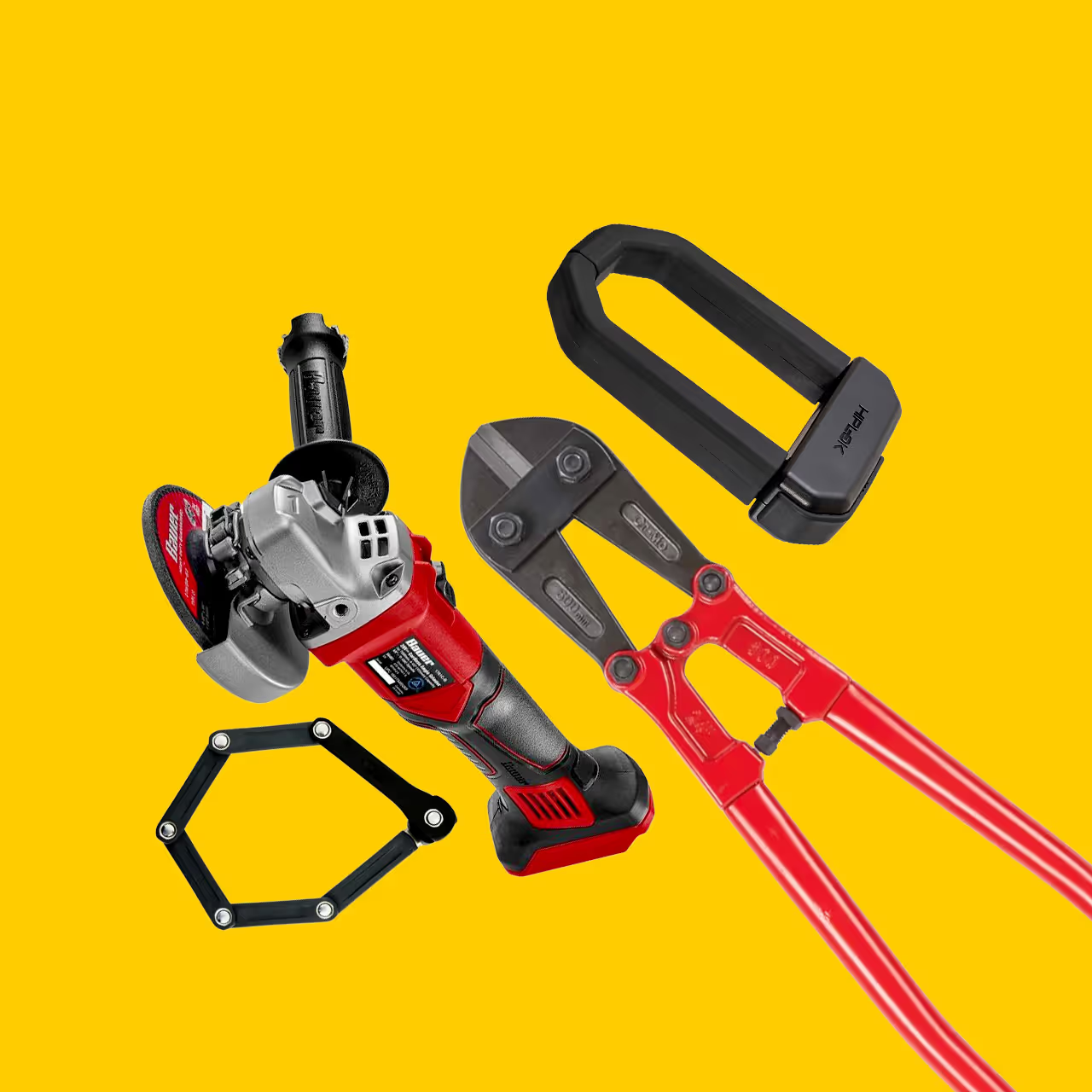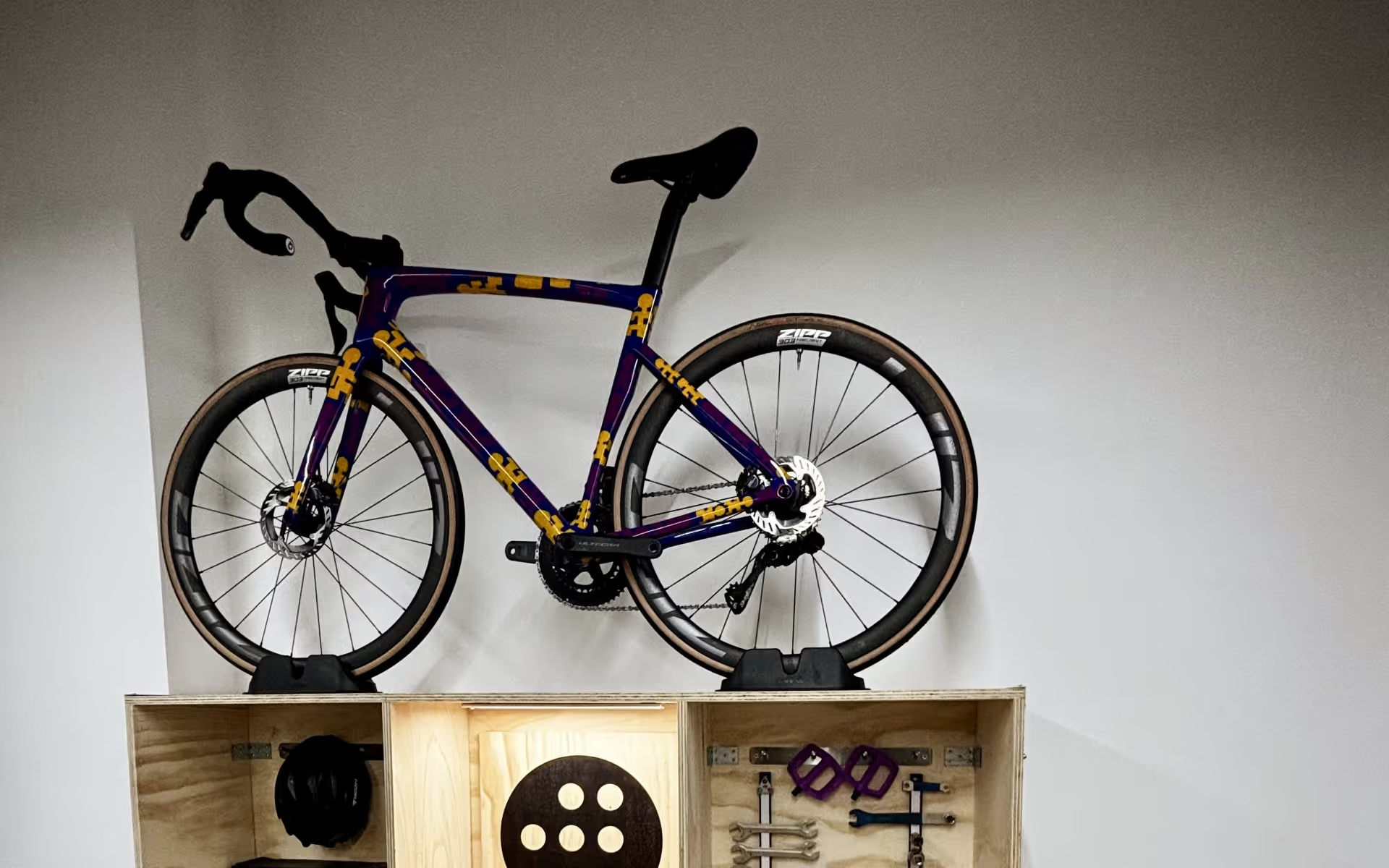Uncuttable? discover the latest bike lock technology
Having the most up-to-date bicycle lock is a winning strategy to stay several steps ahead of bike thieves in the UK. Modern bike locks armed with the latest technology provide key advantages that can make the difference between a successful heist and stopping thieves in their tracks.

Learn about the recent advancements in bike locks, including alarms, folding designs, and “uncuttable” materials that help thwart thieves’s attempts to ruin your ride.
What Bike Locks Are Up Against
Bike locks are the main line of defense against anyone tampering with your bicycle, keeping the frame and wheels securely locked to an immovable object such as a bike rack or signpost. Thieves that want to make off with your entire bike have various attack methods, the most common of which are bolt cutters and angle grinders.
Portable Angle Grinders
The introduction of portable angle grinders changed the game for bike thieves. Traditionally limited by the availability of nearby electric outlets and cord length, thieves can now cut through thick locks in any location. These battery-powered angle grinders can cut quality locks in well under a minute. This is a huge leg up for dedicated bike thieves who are able to quickly break locks with compact and portable tools.
Bike lock manufacturers have had to respond to the threat of compact and powerful angle grinders by bolstering material strength and design. With enough time, any bike lock can be cut with an angle grinder but increasing the required time can significantly reduce the chances of a successful attack.
Bolt Cutters
You’d think the present-day bike thief would need to carry a powerful angle grinder to stand a chance against modern bike locks, but they can often get away with a pair of traditional bolt cutters. Why would thieves require fancy tools when so many cyclists are still locking their bikes with weak cable locks that can be quickly snipped with bolt cutters?
Sundays insurance does not cover incidents of bike theft where only a cable lock was used, due to their low-security level. Sundays’ list of approved locks features highly rated D-locks, folding locks, and heavy-duty chains to properly secure your bike.
Latest Bike Lock Technology
The good news is that bike lock manufacturers constantly improve their products, making them increasingly resistant to attacks. Even standard D-locks these days are miles better than the heavy-duty bike locks from the past. The largest of these modern locks typically have a 16-18mm diameter boron steel shackle with a 6-pin high-security lock cylinder that secures both ends of the shackle.
But the highest security locks don’t stop there. The latest bike lock technology includes integrated alarms, folding or wearable designs, and cut-resistant materials. Interestingly, there is less innovation these days around the lock cylinders since they are quite thief-proof already— picking a lock requires significant time and expertise, so many thieves will reach for bolt cutters or an angle grinder instead.
Ferosafe and Hiplok Bike Locks
Ferosafe is a new graphene composite material that resists cuts from an angle grinder. Created by polymer manufacturer Tenmat, the Ferosafe material is used in Hiplok’s 1000 Series anti-angle grinder bike locks. Hiplok claims that it takes more than 20x as long for angle grinders to cut through this material than those used on standard D-locks!
The material’s main advantage is that it can effectively resist high-power angle grinder attacks while having a lower thickness and weight than conventional materials. The Hiplok D1000 model has a Diamond rating from Sold Secure and a lifetime warranty.
Barronium: Fused Composite Armour
Another leading bike material is the Barronium® technology used in LITELOK X bike locks. The tough material is designed specifically to withstand attacks by angle grinders. The composite material fuses cut-resistant ceramics to the hardened steel core for superior overall strength.
Barronium causes immediate and significant wear to grinder wheels so thieves have to use multiple grinder discs and battery packs to successfully cut the lock. The Barronium technology is available on the LITELOK X1 and thicker LITELOK X3 D-locks— both models receive a Sold Secure Diamond rating.
Proteus: The “Uncuttable” Material
Published in a 2020 scientific study, Proteus may be the most exciting non-cuttable material for future bike locks. The lightweight material is made of ceramic spheres held inside a flexible aluminum structure. The material’s unique construction is inspired by nature, specifically the impact and cut resistance of grapefruits and abalone shells.
Proteus can’t be cut by angle grinders because the vibrations from the ceramic spheres blunt the grinder wheels and any fragmented particles harden the material as the cutting disc speeds up. There haven’t been any recent updates about Proteus, so we’ll have to be patient and see if this innovative technology makes its way into bike locks in the future.
Folding Locks
Folding locks have been around for a while but revolutionized bike lock convenience and security when they were released. The ABUS Bordo Granit was the first folding lock introduced back in 2010, initially referred to as a “link lock”. Modern folding locks are even stronger and more secure, making them a popular choice for all cyclists. The compact folding design is easy to mount to a bike frame or slip into a backpack. Sundays has put together a range of approved folding and alarm folding locks.
Smart & Alarm Bike Locks
Some of the latest bike locks work smarter, not harder, to protect your bike from theft. For example, the 770A SmartX bike lock from ABUS operates via a mobile app and has an alarm function. With no need for a physical key, users can lock and unlock the smart lock with their phone. This app and keycard system also allows multiple users to share secure access to the lock.
If you move more than two meters away from your bike, the SmartX locks itself automatically. The lock emits a short warning tone when it senses light touches or tampering. A deafening 100-decibel alarm will activate in case of suspicious vibrations from an angle grinder attack.
Wearable Locks
It’s not often that bike locks receive a complete redesign, but Hiplok came up with high-security wearable locks. The wearable fastening system adjusts around the waist without locking to the body for a safe and convenient way to carry your lock. The reflective band across the lock adds an additional layer of safety when riding at night. The unique product won the Eurobike Design Award and launched the brand's expansion into other styles of high-security locks. There are now several brands with various wearable belt-style locks on the market.
Creativity Corner: Out-There Bike Lock Solutions
Wild ideas related to bicycle security show that the wheels of innovation continue to turn. Some of these inventive bike locks are quite wacky but can help discourage bike theft. And if a bit of outside-the-box thinking is what’s required to keep your bike safe, then we’re here for it. Remember, however, that these locks and creative security solutions aren’t officially approved by Sundays.
- Kuat Bottle Lock: This clever lock is disguised as a water bottle with a 1.5-meter internally coiled 8mm cable that locks back into itself. It fits into a standard water bottle cage. There’s also a compartment underneath to store keys or cash.
- SkunkLock: This armed D-lock contains pressurised noxious chemicals that are released upon cutting.
- Altor SAF Lock: This larger-than-life D-lock featured an enlarged outer metal layer to thwart angle grinding attacks. It looks cartoonishly big but is quite effective.
- Yerka Self-Locking Bike: This quirky bike has a modular downtube and seat post that pull apart to transform the frame into its very own bike lock.
Frequently Asked Questions
Is there a bike lock that cannot be cut by an angle grinder?
No bike lock can be 100% angle grinder-proof but products like the Litelok X and Hiplok D1000 make the task nearly impossible. The D-locks’ advanced composite materials are so resistant to angle grinder attacks that thieves will have to swap out the grinder wheel and battery several times before they get all the way through.
Do bike thieves use angle grinders?
Yes, battery-powered angle grinders are a tool of choice for bike thieves because of their portability and compact size. Modern angle grinders are quieter, more powerful, and super effective on many styles of locks.
What’s the most secure type of bike lock?
Bike locks that receive a Diamond rating from Sold Secure have been independently tested and given the organization’s highest honors. Heavy-duty D-locks are a common and high-security option— there are also alarm locks that produce loud sounds if they are being tampered with. Check out Sundays’ list of approved locks that offer high levels of protection against bike theft.
References and resources
Angle Grinder Proof Bike Locks: thebestbikelock.com/security/angle-grinder-proof-bike-lock/
Skunklock: skunklock.com/chemical/
Yerka Bicycles: yerka.store/collections/bicycles
Altor Locks: altorlocks.com/pages/about-us
Conrad Pole-Climbing Bike Lock: www.youtube.com/watch?v=lbQu_IVUURA
Sundays List of Approved Locks: sundaysinsurance.co.uk/approved-locks




